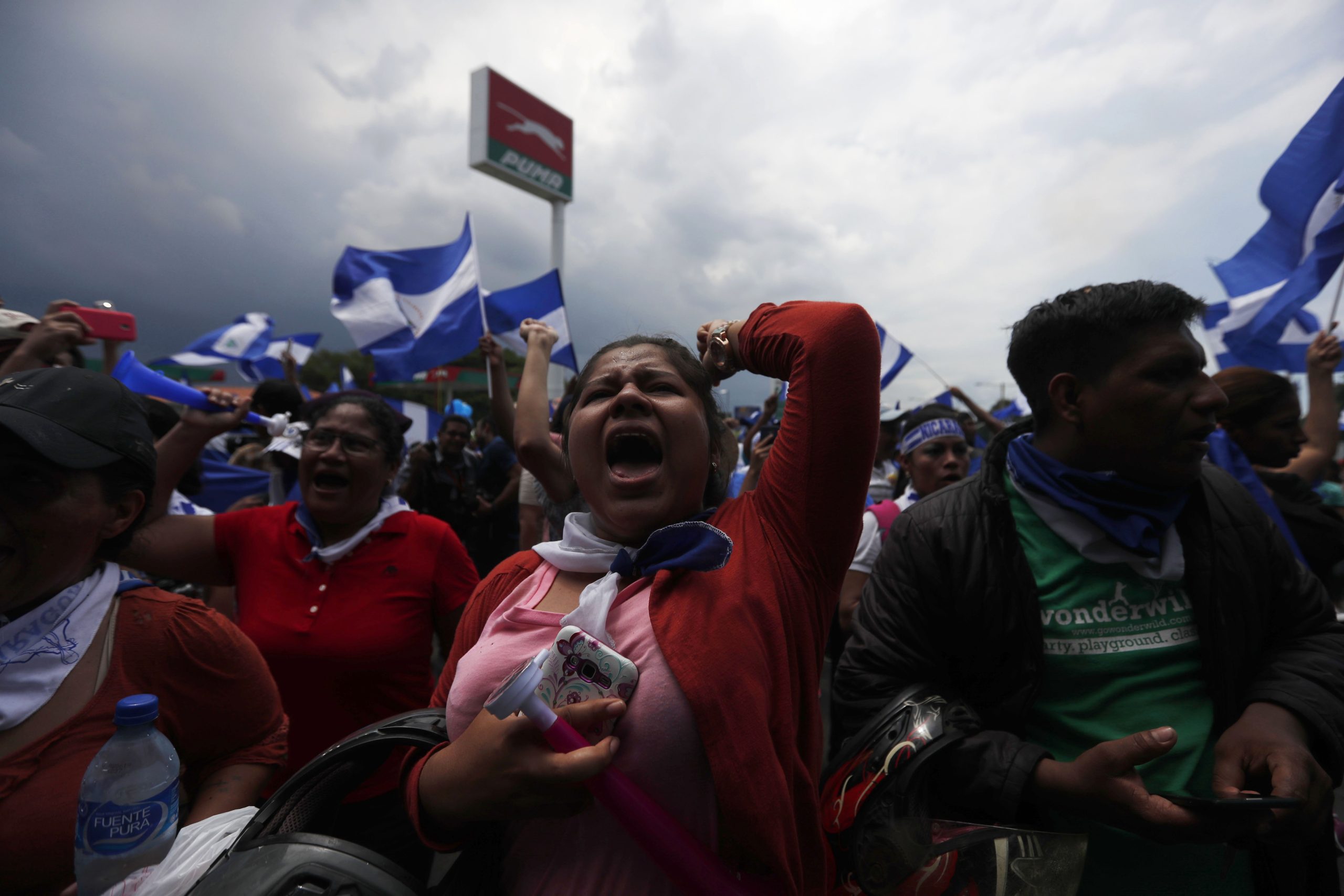In the evenings, Ricardo goes out running for an hour and a half. He runs about 30 laps around a park — its location is not disclosed for security reasons — near his home. He started this routine eight years ago when he was slightly overweight. At the time, he was 18 years old and had just started studying economics at the National Autonomous University of Nicaragua (UNAN-Managua).
Exercising, Ricardo lost more than 20 pounds in a few months. He had already reached his ideal weight, but he kept running around the same park to stay fit. He did this until April 19, 2018, when he saw smoke moving across the gray sky that afternoon and felt difficulty breathing and a burning feeling in his face from tear gas fired by the police at protesters near the Polytechnic University (Upoli).
Ricardo, along with other friends, tried getting closer to Upoli, but could not reach it as the area was surrounded by police and members of the Sandinista Youth (JS). He returned home and saw the news of the police repression on social media. “I got texts from co-workers, summoning us to UNAN the next day, because they were already talking about taking over the university,” says Ricardo, who is now 26 years old.
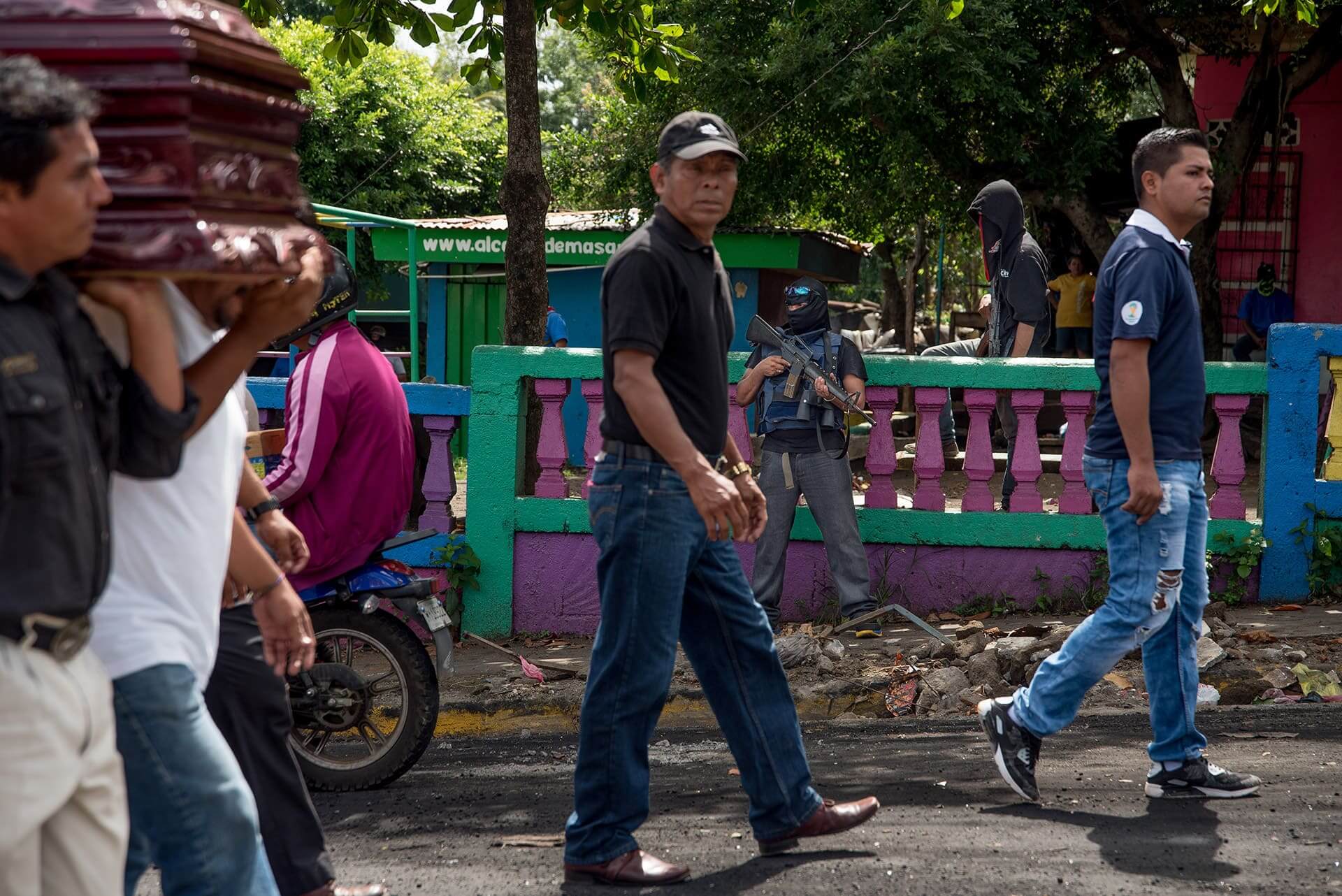
“I’ve stopped talking about April”
Since that day, April 20, 2018, Ricardo experienced many things in a short time: he got involved in the April Rebellion protests more quickly than he expected, he was one of the students barricaded in UNAN as a form of protest, saw friends die, survived clashes with police and paramilitary groups, was imprisoned for a week in the old Chipote prison and received death threats from former university classmates.
“I decided to disappear to survive,” says Ricardo, who stopped studying at UNAN, and although he later enrolled in a private university, he couldn’t finish his studies either. “I lived with anxiety and fear of leaving my house, I couldn’t concentrate on my studies,” he recalls.
Ricardo stopped being part of the emerging political movements. He still has friends he made during his time at UNAN, many of them now in exile, but most of his current friends he knew before 2018. “I’ve wanted to stop talking about the issue (of the April Rebellion) because I think it’s the best thing for me, and to stay in Nicaragua,” says Ricardo, adding, “I remain an opponent, I’m against most of the abuses done by the (Sandinista) government, but we’re here alone and threatened.”
Fearful critics
Six years have passed since thousands of young people, like Ricardo, started protesting against the government, whose response was merciless: 355 dead, hundreds arrested, and thousands injured and exiled. “Those of us in Nicaragua are just surviving,” says Ricardo.
Six years after the April Rebellion, we spoke with people who currently live in Nicaragua under the dictatorship. It is a country dominated by a police state, where people are arbitrarily expelled or prohibited from returning to the country; there are more than 100 political prisoners; seizures, harassment, threats, and even exile happen just for having different opinions.
The people interviewed participated in the 2018 demonstrations. However, none of them are currently involved in any political party or organization. Most consider themselves against the regime and critical of their system, but none criticize the government even on social media — due to the fear of the Cybercrime Law — because they are afraid for their safety and that of their families.
Ricardo says he is slowly overcoming his traumas and “getting my life back.” One of the activities he has resumed is running around the park. For more than four years, he stopped because the police surrounded this and other places to prevent any gathering or protest. After a few months, Ricardo lost his fear of the police: they look at him like any other person who goes running in the park, he says.
Now, Ricardo walks past the police without fear after every run. “Sometimes I greet them and say good evening, sometimes they respond,” says Ricardo, laughing. “This is what I have to do to go unnoticed,” he adds.
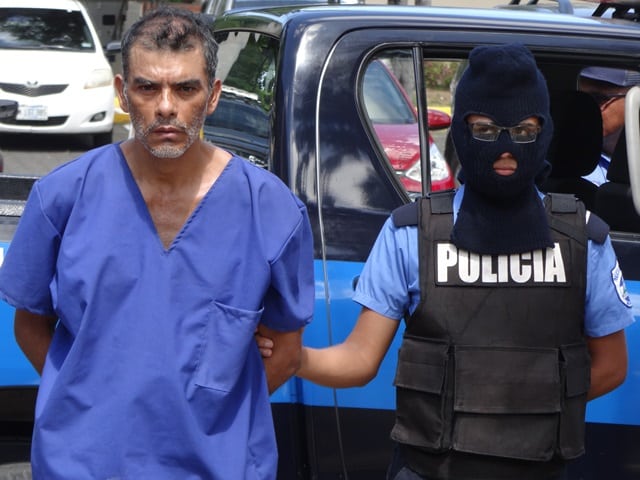
Dead in a dump
As the anniversary of the April Rebellion approaches, tension rises in the streets of Nicaragua. The police patrol iconic locations of the 2018 demonstrations and harass opponents still living in the country. At least five people have been arrested in recent weeks, all family members of victims of the protests and former political prisoners.
On April 15, Carlos Alberto García Suárez, a 52-year-old former political prisoner, was found dead in the municipal dump of Jinotepe, in the department of Carazo, in the south of the country. Ninety percent of García’s body was burned.
García was imprisoned in November 2018 and released in May 2019. During those months, he was accused of the alleged crimes of “kidnapping, torture, assault, injuries, and illegal possession of weapons.” These were the charges levied against opponents at the start of the protests.
The Nicaraguan police and the Institute of Forensic Medicine ruled out foul play in García’s death. However, the Group of Reflection of Former Political Prisoners (GREX) suggested that the case “must be investigated by competent and serious bodies in due time to hold the direct and indirect responsible parties accountable.”
Ricardo Baltodano, a member of GREX, stated that the government is the main suspect in García’s death. “It’s to send a message to former political prisoners to walk carefully, as we say,” Baltodano pointed out.
GREX considers that this case illustrates the attacks on former political prisoners, “now turned into permanent objects of persecution and political harassment.”
Exiled journalist Kalúa Salazar denounced that the harassment to the families of exiles has increased. “For seven days, my family has suffered a new wave of nighttime harassment that disrupts the peace and sleep of my daughters and mother. I understand that other families of exiled journalists from Bluefields are going through the same thing,” she explained.
We live in a bubble
Lucy, a 52-year-old woman, was involved in different opposition movements in 2018 and participated in protests against the government. When I met her, she was collaborating with aid committees for the families of the victims, the injured, and political prisoners. However, in 2021, when repression intensified, Lucy decided to “disappear.” She moved houses, avoids public places, and doesn’t even go to the movies, which she enjoys. “I only go to family events,” she says.
Lucy says she lives “as isolated as possible” because she wants to make the operators of the Sandinista Front believe that she and her family fled the country. “I know that if they wanted to catch me (the Sandinista Front), they would have already done it, because those of us who are here (in Nicaragua) live in a bubble until the witch (Rosario Murillo) pops it,” she mentions.
Lucy says that citizens do not want to express opinions about politics due to the fear of exile, confiscation, and imprisonment. “What exists in the country is a fragmented opposition without a plan for civil resistance,” Lucy points out. “Now we are worse off because the international community is worried about other geopolitical issues and increasingly indifferent to what we experience here,” she says.
– How do you think the opposition in Nicaragua is doing? – I asked Lucy.
– I think there is generalized fatigue, but also fear, hopelessness, and economic need… People try to move on with their lives, recharge their batteries, create their own protection shield, and that means being as inconspicuous as possible.
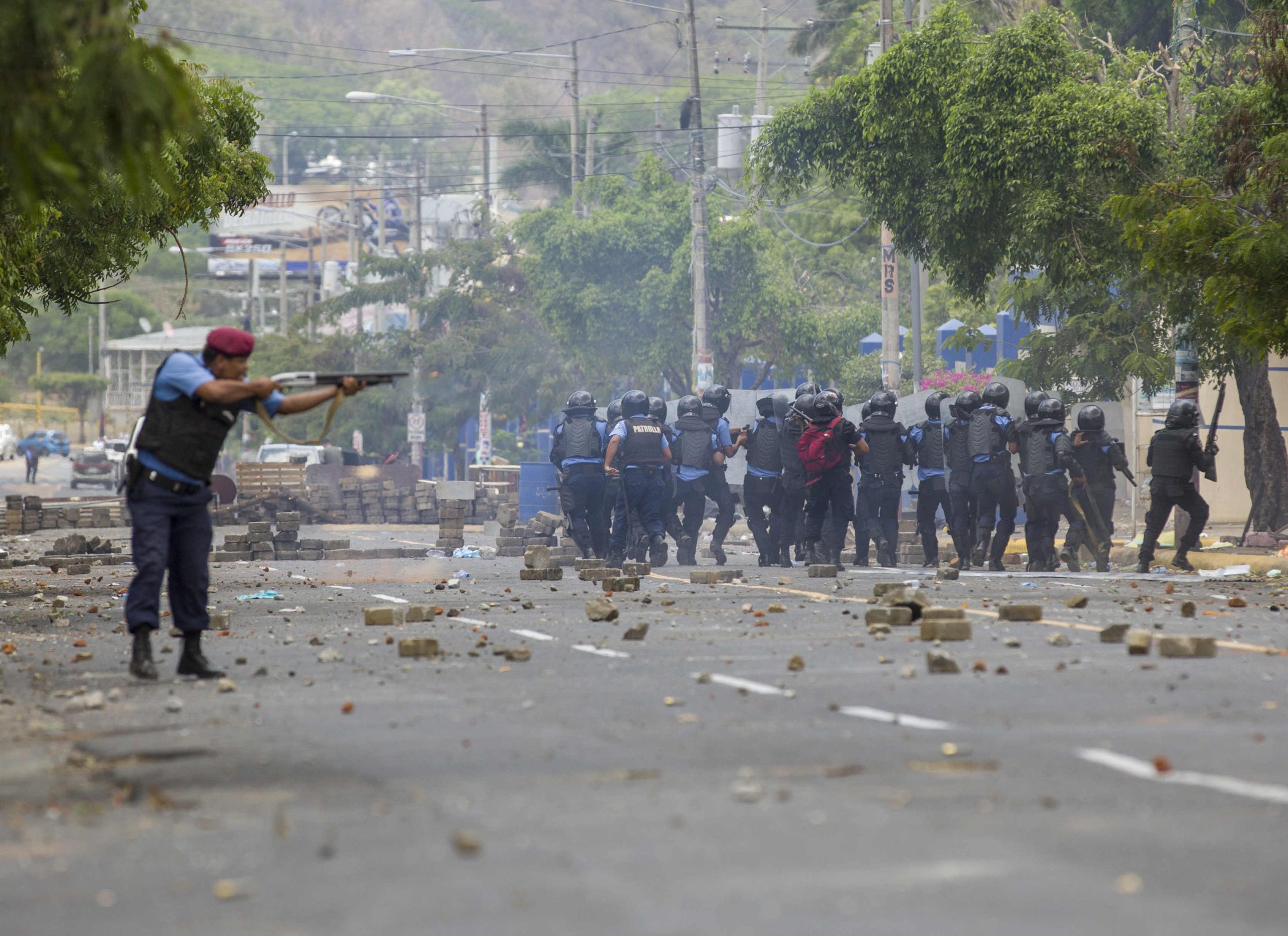
We were excited to change things
In April 2018, I met Alejandra, who participated in the protests at Upoli. At the time, Alejandra was 22 years old and was studying Management at the university. Alejandra brought supplies while they were barricaded on campus.
Alejandra says her father asked her to stay away from the protests. She agreed because “the repression scared me, and I saw how they imprisoned friends from Upoli.” A few months later, Alejandra got a job at a bank in Managua, where she still works. “I distanced myself from all of that… when I joined the marches, we were excited to change things, but then we realized it was going to be more difficult than we thought,” Alejandra says.
Despite everything, she is not a supporter of the regime either. “I haven’t voted in the elections nor attended party events or meetings in the neighborhood,” Alejandra, now 28 years old, says.
In addition to her job, Alejandra sells jewelry — imported from the United States — on Facebook and Instagram. “I’m dedicated to my job and this small business, and I’m not involved in any party, nor do I criticize on social media,” she says.
Being “flagged” as an opponent
Bryan, another person who participated in the Upoli protests, works as a driver for the inDrive vehicle service platform. On April 21, 2018, he was injured in his left leg by a projectile fired from a riot police shotgun.
The moment was captured by a media outlet covering the demonstrations. His leg was soaked in blood, but “it was a minor injury,” says Bryan, who still has the scar. “I think I bled a lot because I was agitated,” he estimates.
A few days later, Bryan returned to Upoli to collaborate with the young people who had occupied the university as a form of protest. He stayed there until the police and paramilitary loyal to the regime regained control of the campus through gunfire.
Bryan, now 26 years old, dispersed like many thousands of other young people and later faced threats from Sandinista operators in his neighborhood. “When the Sandinistas took Upoli, I stopped participating in the protests, but in the neighborhood, they had seen me, they knew I was uploading videos to my Facebook profile about what was happening at the university,” Bryan says.
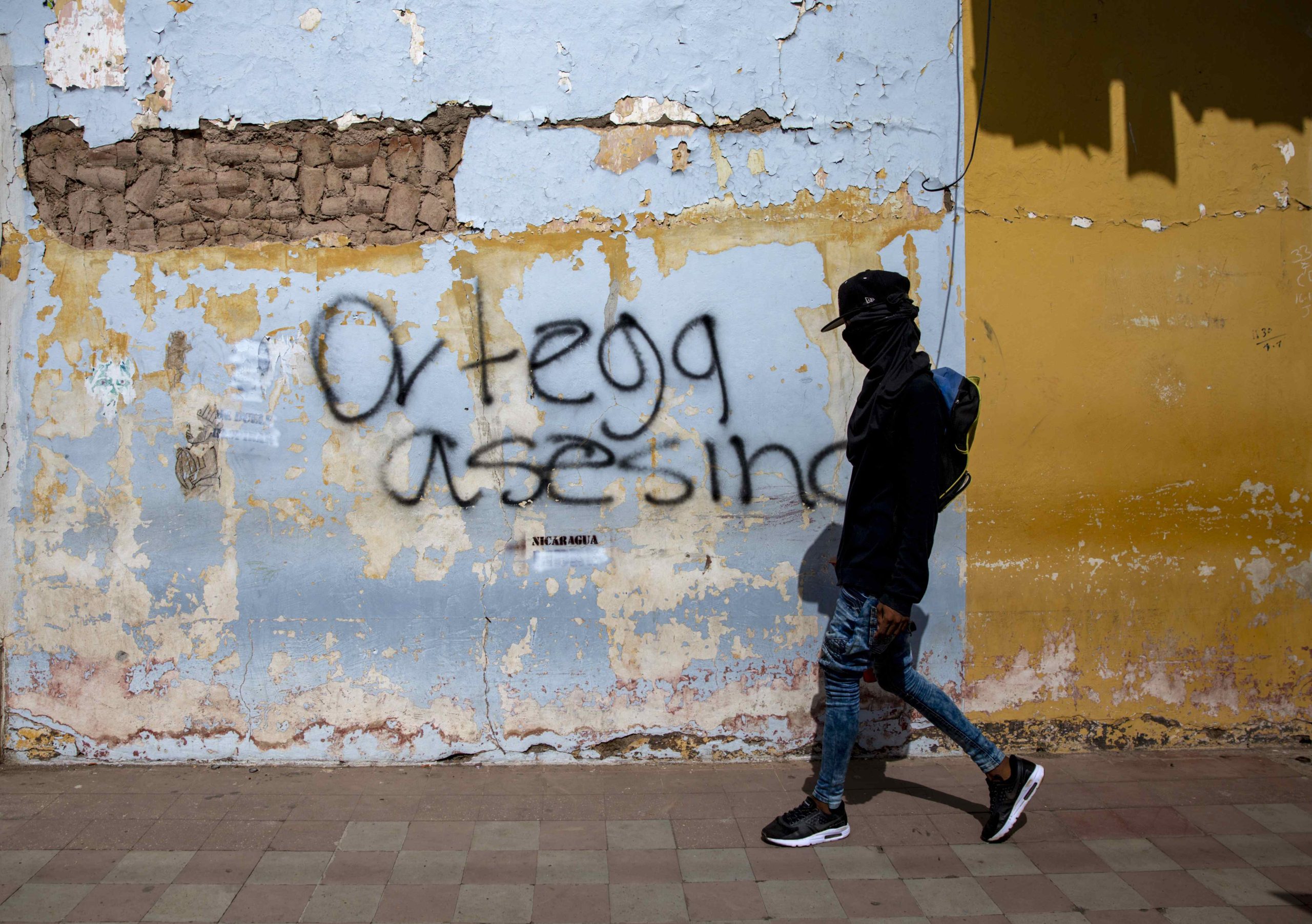
Bryan’s parents were supporters of the Sandinista Front, and because of this, the neighborhood official warned them that Bryan was on a list of opponents to watch. “My mom spoke with him (the official) and promised that I wouldn’t get involved anymore, but that they should remove me from that list… she made me promise too,” he recounts.
Before the 2021 presidential elections, the Sandinista Front sought Bryan to participate in a Voting Reception Board (JRV). “They (the Sandinista Front) need to fill the seats at the voting tables, both from their party and the other parties that don’t have a strong electoral presence, so they approached me,” Bryan explains. “But deep down, what they wanted was to test whether they could count on me, and I did it; it was the only way to stay in Nicaragua.”
For this report, Bryan spoke out because he says he opposes all the repressive measures of the regime. “I don’t like what they’re doing, even to public employees, but being with them, attending their meetings, playing along, was the only way to stop them from harassing me.”
Bryan says migrating is not an option for him. He has no family or financial resources in other countries. For that reason: “the only thing I do is resist and wait for change,” he says.



